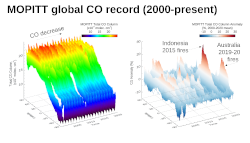Sara Martinez-Alonso gives Harvard seminar on MOPITT
ACOM scientist Sara Martinez-Alonso delivered an online lecture about remote sensing to the Atmospheric and Environmental Chemistry Seminar at Harvard University in Boston, Massachusetts on October 9, 2020. Her recorded presentation is available for viewing at the ACOM YouTube channel, with permission from Harvard University.
Abstract
Carbon monoxide (CO) is of great importance for understanding climate and to monitor and predict air quality. Tropospheric CO is produced by incomplete fuel combustion, biomass burning, and oxidation of methane and other hydrocarbons. CO’s main sink is oxidation by OH; this reaction produces greenhouse gases such as CO2 and tropospheric O3. Additionally, OH involved in reactions with CO is not available to scavenge other greenhouse gases such as CH4, which then have a longer lifetime in the atmosphere. CO is also an excellent tracer often used to monitor the distribution, transport, sources, and sinks of polluted plumes. Satellite-borne instruments, which allow for global coverage at high temporal resolution, are key to understanding the global distribution and trends of tropospheric CO.
In this talk we will summarize what was known about CO before the satellite era. We will introduce nadir-viewing satellite CO instruments and datasets, including Terra-MOPITT, which provides the longest global CO record to date. We will highlight advances resulting from satellite studies of CO emissions from wildfires, volcanism, and cities; CO trend analyses; and CO assimilation. Finally, we will peer into the future of satellite CO measurements.
View the seminar on YouTube.
